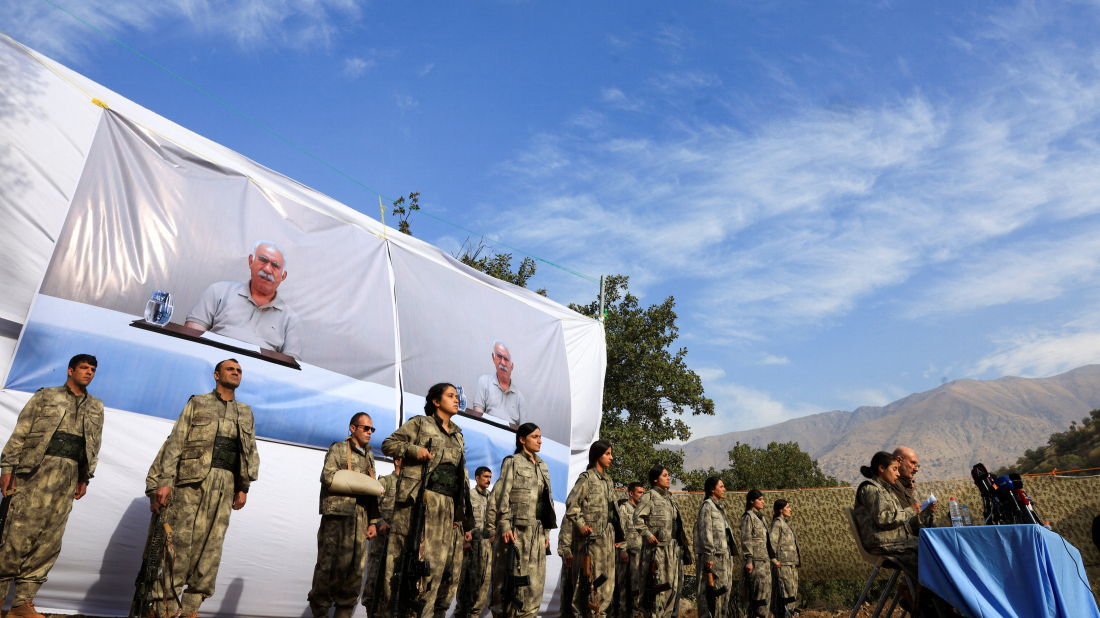FIFA partners with Board of Peace to build soccer fields in Gaza, pledges $2.5 million
Gianni Infantino, president of the Fédération Internationale de Football Association (FIFA), announced a new partnership with the Board of Peace on ...

The outlawed Kurdistan Workers’ Party (PKK) announced on Sunday that it was withdrawing from Türkiye as part of a disarmament process being coordinated with the government, urging Ankara to take concrete steps to advance the initiative.
The PKK, which has fought an armed insurgency against the Turkish state since 1984, agreed in May to lay down its arms following a call from its imprisoned leader, Abdullah Öcalan, to end the conflict that has claimed more than 40,000 lives.
In July, the group designated a terrorist organisation by Türkiye, the United States, and the European Union, symbolically burned some of its weapons to demonstrate good faith.
In a statement from northern Iraq, the PKK said it had decided to withdraw all its fighters to create the foundations for a “free, democratic and brotherly life,” as it moves into the next phase of disarmament and integration. The statement reaffirmed the PKK’s commitment to the peace process and called on the Turkish government to take “legal and political” measures without delay, including legislation that would allow the group’s transition into “democratic politics.”
Omer Celik, spokesperson for President Recep Tayyip Erdoğan’s ruling AK Party, wrote on X that the PKK’s withdrawal represented tangible progress towards the government’s goal of a “terror-free Türkiye” and would help shape the “positive framework” for a parliamentary commission overseeing the legal aspects of the process.
The PKK has long been based in northern Iraq, having been driven from Türkiye’s southeastern border areas in recent years. Türkiye continues to conduct regular air strikes against PKK targets in the region and maintains several military outposts there.
Over time, the PKK’s objectives have shifted from pursuing full independence to seeking greater cultural and political rights for Kurds, along with limited autonomy in Türkiye’s mainly Kurdish southeast.
Ankara insists that Kurdish rights are protected but has made clear it will not tolerate any separatist ambitions. The resolution of Türkiye’s decades-long conflict with the PKK could have far-reaching regional implications, particularly in neighbouring Syria, where U.S.-backed Kurdish forces are viewed by Ankara as an offshoot of the PKK.
The drumbeats have finally faded at the Marquês de Sapucaí, bringing the competitive phase of the Rio Carnival 2026 to a dazzling close. Over two marathon nights of spectacle, the twelve elite schools of the "Special Group" transformed the Sambadrome into a riot of colour.
Peru’s Congress has voted to censure and remove José Enrique Jeri Ore from his posts as President of Congress and acting President of the Republic, just four months into his tenure, citing undisclosed meetings with Chinese businessmen and alleged hiring irregularities.
Israel is preparing for the possibility of receiving a green light from the United States to launch strikes against Iran’s ballistic missile system, according to Israel’s public broadcaster KAN.
Aghdam’s Qarabag FK experienced a 6–1 defeat to England’s Newcastle United in the first leg of their UEFA Champions League play-off tie in Azerbaijan's capital Baku Wednesday evening (18 February).
France celebrated Olympic gold in the men’s biathlon relay in Anterselva on Tuesday (17 February), following a thrilling race marked by an electric atmosphere at the stadium.
Gianni Infantino, president of the Fédération Internationale de Football Association (FIFA), announced a new partnership with the Board of Peace on Thursday (19 February), committing to build football pitches and arenas in Gaza as part of broader efforts to rebuild the region.
The Board of Peace will be "looking over the United Nations," said U.S. President Donald Trump at the inaugural Washington meeting, where representatives from over 20 countries gathered to unveil plans for Gaza’s reconstruction and coordinate international support.
Iranian and Russian navies staged a joint exercise in the northern Indian Ocean on Thursday, as Washington builds up its military assets in the region, including deploying warships near Iran, despite renewed indirect nuclear negotiations with Tehran.
Britain's King Charles III has stressed that “the law must take its course” after his brother, Andrew Mountbatten-Windsor, was arrested on suspicion of misconduct in public office, insisting a full, fair and proper investigation be carried out by the appropriate authorities.
The Trump administration has given immigration officers wider powers to detain legal refugees awaiting green cards, ordering their return to custody for renewed vetting one year after entering the U.S.
You can download the AnewZ application from Play Store and the App Store.

What is your opinion on this topic?
Leave the first comment